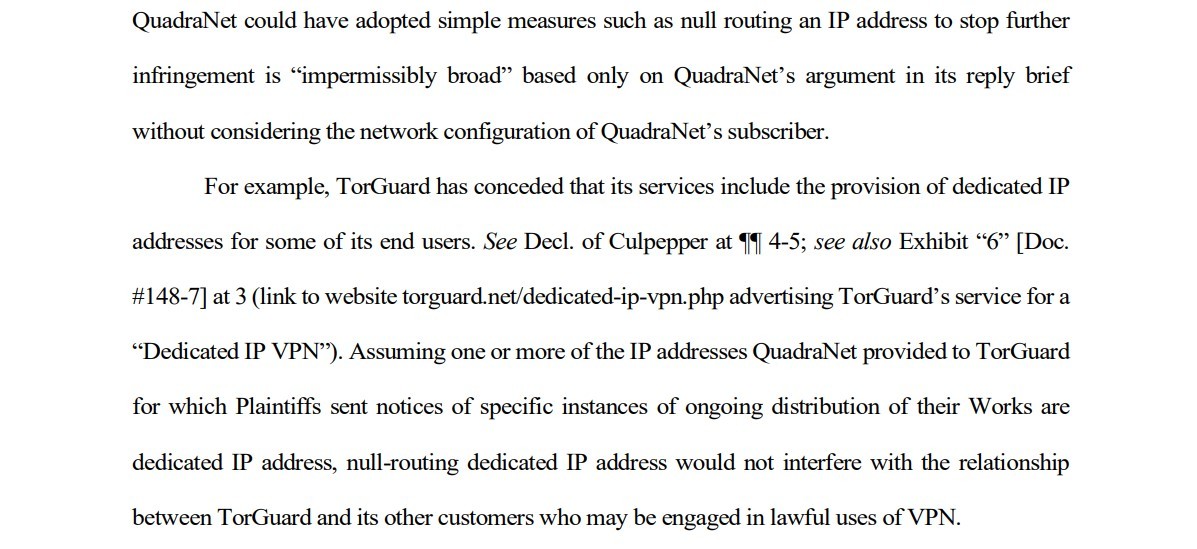 A group of independent film companies has taken the issue of piracy liability to a new level over the past year.
A group of independent film companies has taken the issue of piracy liability to a new level over the past year.
After pursuing lawsuits against file-sharers, pirate site operators, and app developers, they started going after VPN providers and their hosting companies.
This strategy has resulted in a few settlement agreements already. VPN providers Torguard, VPN Unlimited, and VPN.ht all agreed to block torrent traffic on U.S. servers. Hosting company Sharktech did the same and also promised to block popular torrent sites including The Pirate Bay, YTS, and RARBG.
It’s unclear whether any damages were paid as part of any of these settlements. What we do know is that the agreements are now being used as ammunition in other cases, as we previously predicted.
Filmmakers vs. Quadranet
This is also happening in a lawsuit filed by a group of filmmakers against hosting provider Quadranet. The Californian company was not inclined to settle and fought back, with success. Last December, a Florida federal court dismissed the complaint.
The filmmakers’ tried to hold the hosting company accountable for pirating subscribers of VPN companies that hired servers at Quadranet. According to the court, the hosting company didn’t have any straightforward options to stop or control the infringing activities.
The court left no option open to amend the complaint and present new evidence, but the filmmakers were not giving up just yet. They submitted a motion for reconsideration arguing that there is new evidence and sufficient ground to move the case forward.
Null-Routing
Part of the filmmakers’ legal theory is related to the measures that the hosting company could have taken in response to the copyright infringement notices it received. This includes the null-routing of IP-addresses, which makes them unusable, and would stop the infringing activity.
The court previously concluded that this measure would go too far as legitimate VPN users could use the same IP-addresses. In addition, Quadranet would interfere with the relationship between VPN companies and their customers, which makes it an “impermissibly broad measure.”
The filmmakers disagreed. In their motion for reconsideration, they cited statements from VPN provider TorGuard which said that null-routing is a standard practice among some VPN providers. This would not harm other customers.

In the motion for reconsideration, they further suggested that the court should not confuse null-routing of an IP address with null-routing an account.
Court Rejects Filmmakers Arguments
This week, Florida District Court Judge Beth Bloom ruled on the motion, which didn’t convince her to drastically change the previous order. Instead, Judge Bloom doubled down on the conclusion that null-routing is not an effective anti-piracy measure in this instance.
“The Court recognizes the technological distinction between null-routing an IP address and null-routing an account that Plaintiffs now seek to emphasize. However, Plaintiffs fail to persuade the Court that null-routing IP addresses is a practical, effective measure,” Judge Bloom wrote.
The TorGuard declaration doesn’t change this and has no bearing on Quadranet, Judge Bloom says. The same is true for the argument that another hosting company, Sharktech, voluntarily chose to block torrent traffic and torrent sites.
“The manner in which Sharktech operates and is willing to implement systems to attempt to block pirating websites is from an unrelated settlement agreement that has no bearing on Quadranet’s ability and alleged obligation to implement similar measures,” Judge Bloom wrote.
After putting aside TorGuard’s statements and Sharktech’s settlement agreement, the court sees no new evidence of measures Quadranet could have taken in response to the alleged copyright infringements.
Not a Practical Anti-Piracy Measure
Even if the TorGuard and Sharktech information was taken into account, the court would still conclude that null-routing isn’t an effective measure. For one, alleged infringers could easily get a new IP-address.
“[A]ssuming for the sake of argument that Quadranet could null-route a specific IP address — static or dynamic — without interfering with other end users’ legitimate use of the same IP address, Quadranet’s actions would be wholly ineffective as the copyright infringer could get a new IP address to continue infringing Plaintiffs’ copyrighted works.
“In other words, null-routing an IP address or an account is not a practical measure to police infringing activity,” Judge Bloom adds.

All in all, the court sees no reason to amend its earlier conclusion that the filmmakers failed to allege that Quadranet has the practical ability to police infringing activities of third parties. In addition, the motion for reconsideration was denied on other grounds as well.
The only part of the motion that was granted is the request to remove several companies, including After Productions, SF Film, and Hunter Killer Productions from the list of plaintiffs.
While the order is clearly a setback for the filmmakers, it also comes with a silver lining.
Filmmakers Demand Millions from LiquidVPN
Now that the claims against Quadranet and Torguard have been dismissed, they can go ahead with the motion for default judgment against LiquidVPN. The court previously denied this motion, as it could lead to inconsistent judgments, as the claims against the other defendants were still pending.
The filmmakers didn’t waste any time. Yesterday, they filed their motion for a default judgment against LiquidVPN, which failed to defend itself in court. Among other things, the companies request $9,900,000 in damages for the copyright infringement of 66 works and $4,950,000 for violating the DMCA by altering copyright management information.
On top of those and other damages, the filmmakers also request that LiquidVPN, whose homepage disappeared months ago, starts blocking popular torrent sites including The Pirate Bay, RARBG, and 1337x.
—
A copy of District Court Judge Beth Bloom’s order is available here (pdf) and the filmmakers’ request for a default judgment against LiquidVPN can be found here (pdf)





